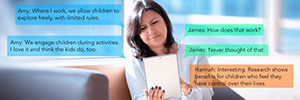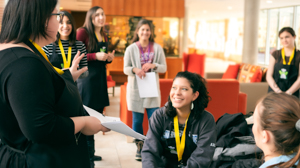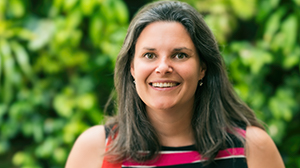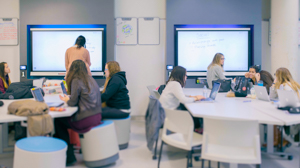- Future Students
- Current Students
- Faculty
- Staff
- Alumni
- Others
Why four UofGH alumni are becoming Child Life Specialists
View an accessible transcript of the above video
When children are experiencing a scary medical issue – whether personally as a patient or watching helplessly as a family member struggles – Child Life Specialists are there. Child Life professionals are experts in helping bring some light into a dark time for infants, children, youth and families, by using play to help them understand what’s happening, or to simply help take their minds off what they’re going through.
McMaster University’s Master’s Degree program in Child Life & Pediatric Psychosocial Care, the first of its kind in Canada, is a highly exclusive program that accepts little more than a dozen students each year.
This fall, four graduates of the University of Guelph-Humber’s Early Childhood Studies program – Faiza Ali, Keanna Gordon, Jocelyn Leworthy and Eden Peters – were accepted and recently began studying in the program.
Though the paths that led them here are drastically different, each of the four UofGH alumni is united in at least one fundamental way: they want to make a difference in the lives of children and families.
“Children are the future, and it’s nice to know that as an adult, you can make an impact on a child’s life, especially one who’s going through a difficult time,” Gordon said. “Then we then watch them go out and do amazing things in the world after.”
The path to child life
Each of the UofGH alumni pursuing the child life specialist program arrived at the profession differently.
Ali knew from the very first time she attended UofGH’s annual Fall Information Day and heard an alum speak about the field that it interested her. Gordon, likewise, was focused on the field for a long time; she initially applied to the ECS program with this very outcome in mind.
Leworthy, meanwhile, was inspired by her own experience growing up.
“A big part of being a Child Life Specialist is the psychosocial support, so helping children cope with really challenging life experiences, whether it be illness, hospitalization, trauma or any other situation,” she said.
“That’s driven my desire to work in that field, and also personally for me growing up with a genetic medical condition myself, I feel like I could have benefited from that support.”
Conversely, Peters discovered her passion for the profession through one of her field placements. ECS students complete more than 800 hours of field placements during their time at UofGH, and all four aspiring Child Life Specialists were able to gain high-level first-hand experience in the field before graduating. Examples of field placements completed by the students included major Toronto hospitals, the Ronald McDonald House and children’s hospices. By the time they pursued the program, all four graduates were already certain it was the right fit.
“With the help of my professors and placement co-ordinators, I applied for a position at the Hospital for Sick Children as a Child Life student, and within the first week, I fell in love with the field,” Peters recalled.
“Bringing a sense of normalcy into these children’s lives, I knew that this was exactly what I wanted to do. If it wasn’t for my professors and placement co-ordinators at Guelph-Humber, I would have never heard of Child Life.”
Making an impact
As the students earn their Master of Science degrees, they’ll learn about pediatric psychosocial assessment and interventions, explore ethical issues, gain an understanding of the foundations of clinical research, and ultimately learn to thrive in a diverse range of pediatric clinical settings.
Through their placements at UofGH, each of the alumni forged valuable memories of working with kids in need. Peters recalls working at SickKids with a teenage girl who was despondent over her condition. After the two spent time together redecorating her hospital room, the young patient’s mood had transformed. The moment resonated with Peters.
“Children are often overlooked but the experiences that they have early in their lives affect them throughout their lives,” said Dr. Nikki Martyn, Program Head of Early Childhood Studies.
“This means it is our responsibility to ensure our students understand not only about child development, curriculum, policies and regulations in the field, but also about what impacts children at the core of who they are; for example, when their mom is diagnosed with cancer or when they are. How can we help the child, in supporting their resilience and ensuring a good trajectory for future growth and development?
“Within our program this is not only taught in the classroom but experienced in the field, over the four years of study. We are very proud of the impact our graduates are making in the world.“
Of course, working in Child Life can stir powerful emotions in both the patient and the professional. Understanding, managing and acknowledging those feelings is also important. But ultimately, the students found working with children to be an uplifting experience.
“You’ll see kids (who are) getting chemo done and they’re getting blood transfusions, but they’re running around with little wires and IVs, they’re still playing games, they still want to talk to you,” Ali said.
“It’s actually very inspiring.”
The University of Guelph-Humber’s Early Childhood Studies program focuses on understanding how children develop as a whole. The curriculum teaches UofGH students how children develop socially, emotionally, cognitively and physically, with lessons based on the latest research and theories on development.
“Our program utilizes an ecological approach to prepare students for their role as early childhood professionals, responsible for supporting the whole child. This means that the curriculum was developed with consideration for all of the internal/biological and external factors that may impact children and their families,” said Elena Merenda, Assistant Program Head of Early Childhood Studies.
“Most importantly, the curriculum provides students with theoretical knowledge and practical experiences with play-based therapeutic interventions. Students are equipped with the knowledge and skills required to implement therapeutic play with children experiencing a multitude of and health concerns, traumatic experiences, and developmental delays. This is what makes our students valuable assets to the Child Life program.”
As these four alumni work toward their post-graduate degrees, they do so confident that the work they’re doing can make a real difference.
“The work that we do helps promote optimal coping, and helps children to be able to go through these challenging life experiences with a sense of mastery, feeling like they can handle whatever life throws at them, and to foster that resilience later in life,” Leworthy said.
“I think that the work that Child Life does is absolutely critical.”







